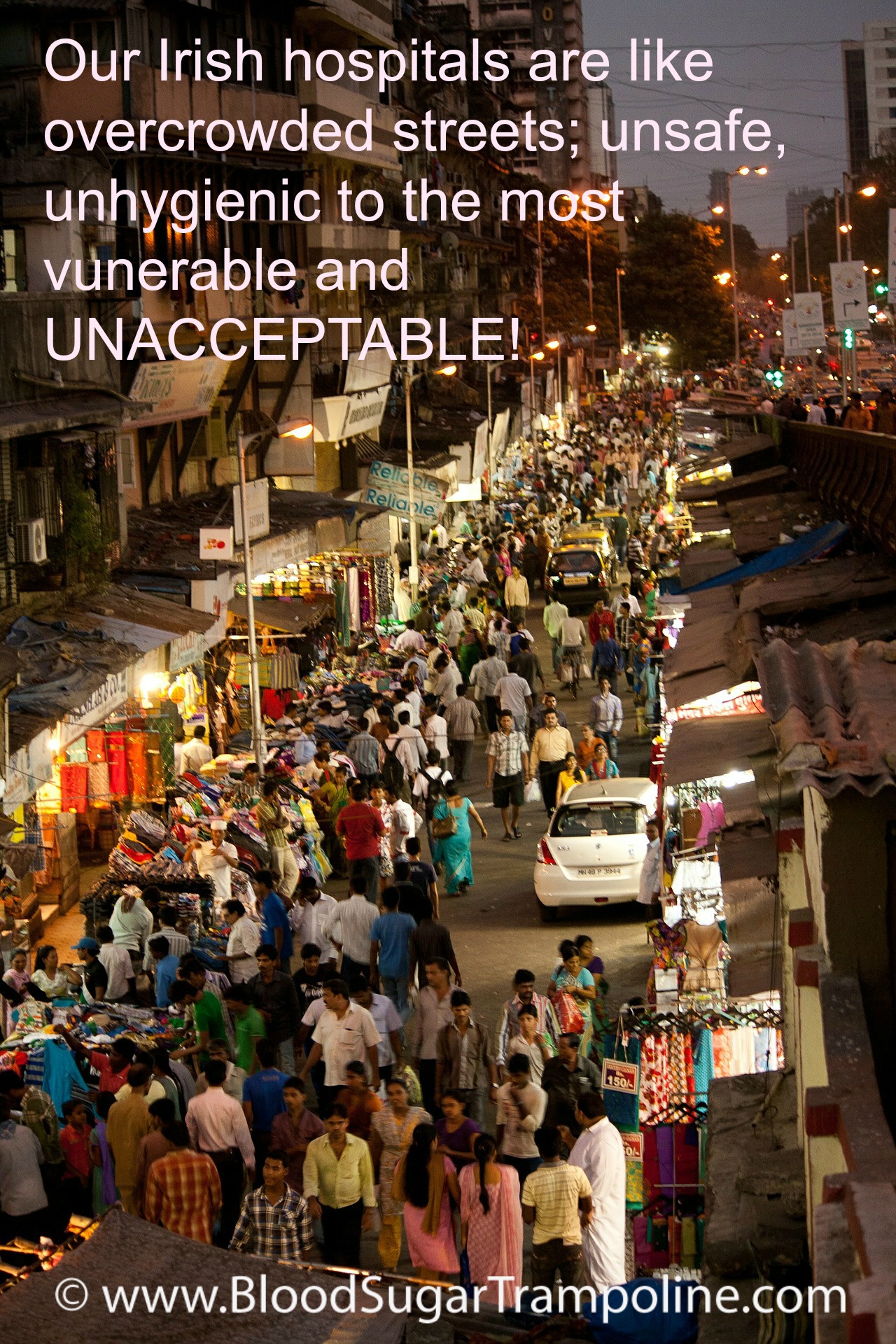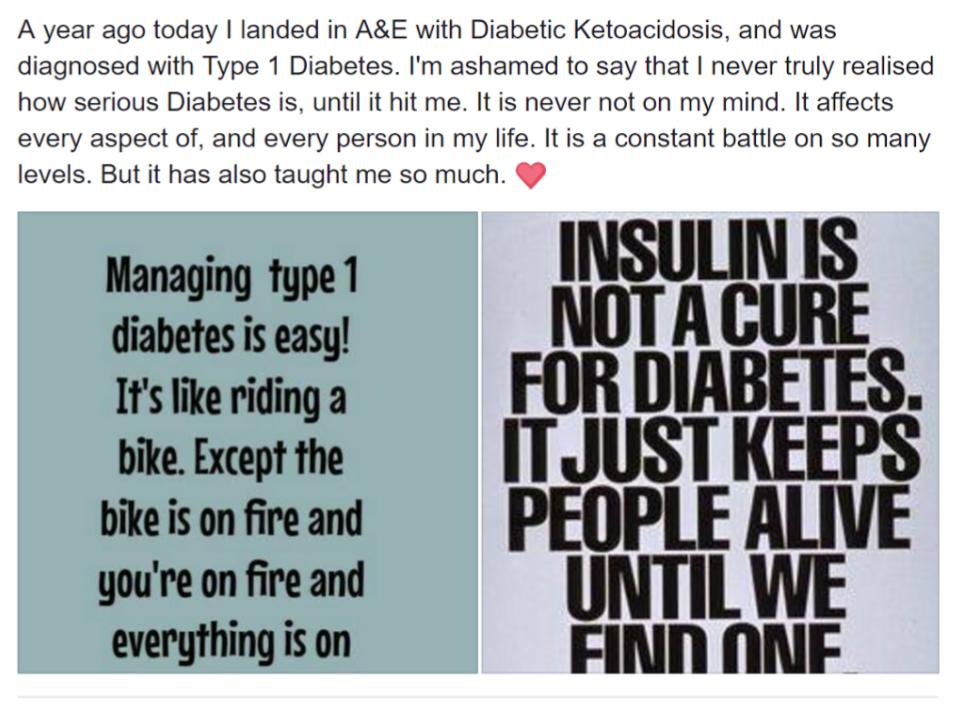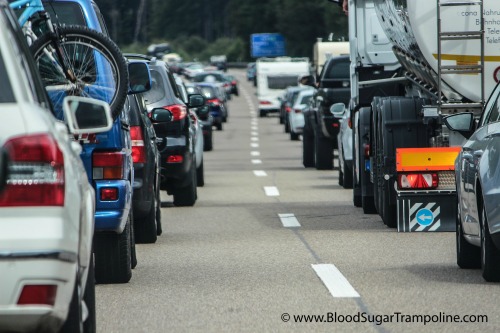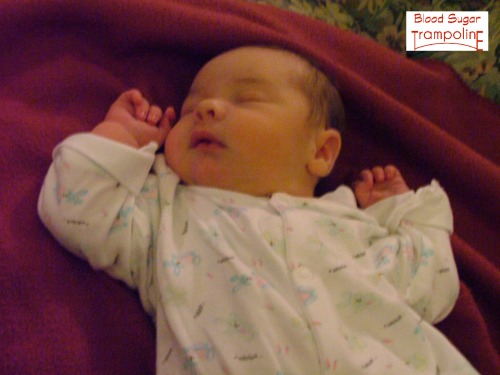Has anyone noticed their blood sugar/glucose numbers dropping lately as the Spring temperatures tease us? Welcome to Spring, where it’s hot, it's cold, it's summer one day and winter the next.
Everything Burnout Except Diabetes
In the diabetes community we talk a lot about diabetes burnout and diabetes distress but I seem to experiencing a form of life burnout at the moment. It’s everything but diabetes burnout.
Yesterday, my daughter asked me, as she does most mornings on our short walk to her school, what I had planned for my day?”. I sighed and said “I have so much to do and I really don't want to do any of it”. My response made me realise that it’s becoming a problem.
And if I'm really honest I've been feeling like this for a while. I sit in front of my laptop thinking about all the things I would like to do, all the things I need to do and then I get so overwhelmed I get maybe one or two things done.
I'm also physically tired and physically hurting. I have a torn achilles' tendon and an achy, stiff hip. Both of these things are annoying and are a big influence on my level of activity.
I know I need to take a real break! I need to stop thinking about conference and event organising, about writing blog posts. I need to switch off from social media. This is the hardest thing to do. I really don’t want to not be connected to the world outside of my house. For me, there is no way to the social media that I need to have for my own support and the social media that partners the event organising and blogging.
I'm so grateful that all things diabetes seem to be going, well, as things usually go with type 1 diabetes, trampoling.
I've lost my enthusiasm for all the things I loved. I know it's just temporary. I know it’s a problem. I know I will address it… and soon.
P.S. Anyone fancy meeting up at the Thriveabetes Sugar Surfing Workshop in Dublin????
Hole-y Health Service
The Irish health service is a mess!
You probably know this! I know this! I've known it for a very long time. I’ve been a regular customer patient of our health services for many years, and I continuously tell people about how terribly under funded it is and the chronic shortage of endocrinologists and diabetes nurse specialists.
Yet, I still wasn't prepared for the shock when I walked into the Accident & Emergency department to find my mother on one of three trolleys (that was only the trolleys I could see) lining up the corridor with no chance of getting a bed in a ward, for a second and consequently third night in a row.
This post is not directly related to my life with type 1 diabetes but it does have implications on the health care I receive.
She had gone to A&E on a Friday evening, having been instructed to do so by her GP, she waited six hours in the waiting room before getting as far as a trolley. During those six hours, she had been triaged, had bloods drawn and was shuttled back and forth from the waiting room outside the A&E departement. Her "trolley" was placed in the main corridor entrance/exit hallway of the A&E department. I surmised that she was given a trolley because her treatment had to be administered through an IV. There she stayed, her trolley moved from corridor to corridor to allow for new patients to take up trolleys, until Monday late morning.
When I visited with her and it was extremely difficult; I was standing at the end of her trolley but as it was the main entrance/exit to the department, I was in the way constantly.
While there I noticed a couple of things that were disturbing to say the least.
The patient across the narrow corridor wedged into an alcove which was JUST wide enough for a trolley. I noticed her towel was drying on a IV drip rack. My mother said she had been there for 4 nights. This prompted the question of how many bathrooms/showers were there available for all of these patients. The answer is one bathroom with one shower for all the patients which was used as a storage area also. Hygiene standards so low in an area where hygiene is so important.

My mother has private health insurance and was using it. So her health insurance company will be charged as if she had a bed in a ward. Neither hospital, patient nor health insurance company wins in this situation.
I notice a young couple with a small child who were shuttled back and forth several times from the waiting room outside the A&E departement. I notice that it was the gentleman who was wearing the admittance wristband. This lead me to believe that because they were waiting on test results and he didn’t require treatment he was left in the waiting room.
WHY ARE PATIENTS ON TROLLEYS?
It’s really very simple! And it’s been said over and over by many, many experts.
“The reality is that there are not enough acute hospital beds, so people who need to be admitted to hospital end up on trolleys,” Dr Fergal Hickey, the IAEM’s Communications Officer, explains to TheJournal.ie.
Our hospitals need more beds and to have more beds they need more nurses. And we have nurses who want jobs. So what the fecking hell is holding this up?
Money! So let’s invest more in our health service and let’s pay more income tax to pay for it. I, for one, do not mind one little bit paying more taxes to get it! If it means that I, or anyone I care about, is well looked after if they get sick.
WHAT WE HAVE AT THE MOMENT IS NOT ACCEPTABLE!
Yet, this has been the situation in our Irish hospitals since I moved back to Ireland in 2006. We all remember the actor, Brendan Gleeson's passionate plea for his mother on The Late Late Show!!!
Our emergency departments are a huge health and safety risk. Major! If you are not sick going into a hospital, you will definitely be sick when you leave! There is a complete lack of infection prevention control measures, in most hospital wards but especially in accident emergency departments (as witnessed by my brother when my mother was brought in - not a single staff member wore gloves or washed their hands. NOT ONE).
Patients spending multiple nights on trolleys is treated as normal practice. Patients have a complete lack of privacy, dignity or basic hygiene.
None of this is acceptable!
OUR HEALTH CARE EMPLOYEES ARE…. overworked and stressed to the point of exhaustion.
Our newly qualified nurses are paid a starting wage of €14.39 (information from a friend who has nearly two years experience). Since 1 January 2017, the national minimum wage for an experienced adult employee is €9.25 per hour. This same friend has had to give up her private health insurance because she couldn’t afford it!!
The current nurse:patient ratio leaves both nurses and patients in very unsafe and dangerous situations on a constant basis.
There is a huge deficit of nursing staff in the HSE. There are recruitment events on an ongoing basis but it is a slow process.
Our Irish hospitals are unionised, heavily, but with a health service top heavy with managers and scarce on frontline staff it’s hard to see who the union is serving first.
How is any of that OK?
SOLVE IT!
I don’t want our health service employees to work less. I want more front line staff in all departments and more beds. Stop trying to recruit our Irish nurses back from overseas until you give our new nurses a decent wage. Start at home! Word will spread and they will come home without expensive recruitment campaigns.
Seriously, is it really more complicated than that????
To all the policy decision makers and implementation makers, Stop talking, start funding and start doing!
Because I can't do anything, not a single thing and it's killing me and thousands of others - YOU have to do it!
Diabetes Awareness - What, Why?
Have you seen those posts on Facebook where you copy and paste a message that supposedly creates awareness for a heartbreaking illness without actually giving us any information about said illness? I come across them a lot, usually not for diabetes though. And then I saw this from a lady I had met recently. Now this is Awareness!
 You see, no amount of copy and paste onto my facebook profile page will create any awareness if I don’t mention something I know about that illness.
You see, no amount of copy and paste onto my facebook profile page will create any awareness if I don’t mention something I know about that illness.
This post prompted me to delve a little deeper into what exactly do the words “Diabetes awareness” mean to me and why do I want to create awareness around diabetes?
WELL, FIRSTLY, WHAT IS AWARENESS?
The definition from the Collins English dictionary of “Awareness” is having knowledge. So creating diabetes awareness is to inform people about it. And “Since informing the public can effect change, Raising Awareness is often the first activity an advocacy group engages in”- Marie Ennis-O’Connor, patient advocate.
But why do I want people to know about diabetes? Why would they need to know?
Is it because I want sympathy? Is it because I want people to know exactly how hard my life is? No, that’s not it for me.
I’ve begun to realise that there are different types of “audiences” for diabetes awareness and that my message changes depending on what group I’m with. Such as, if I’m talking to a local TD I’m usually asking for funding to improve health services, so I need to outline how much is saved through this investment and how quality of life with diabetes is improved.
LET’S BREAK IT DOWN; WHO NEEDS TO KNOW ABOUT DIABETES?
- My family and friends, - General public at large (i.e. The Masses) and - People who make decisions around our health service. - People living with diabetes.
WHAT AND WHY DO THEY NEED TO KNOW?
Each of these groups needs different information and for different reasons.
Diabetes Awareness for; people who know me. AKA Friends and Family.
This kind of awareness is very personal. And it revolves on what to do and say around me. This can be very tricky and even very dangerous. My husband has learned that if he asks me how I am and I say “Fine” that it’s code for “I am not fine at all!!! And God knows what mine field you might enter?”
For me this is a huge area of awareness. It involves teaching people not to be members of the diabetes “police” and not asking if I can eat that? To making sure you know how to administer a glucagon injection if I lose consciousness.
WHY? I teach my nearest and dearest all that I know about my diabetes so that they can support me in it.
Diabetes Awareness for; Members of the General Public.
Since starting my journey in diabetes awareness I have learned that a lot of people do not know that Diabetes can happen to anyone!!! Any age, any health, AN-NY. BODY. It’s a completely random condition, especially Type 1 Diabetes!
Everyone should know a couple of key pieces of information about diabetes, it may reduce your risk of diabetes complications and maybe even save a life.
WHY? A lot of people have type 2 diabetes and haven’t been diagnosed yet, which can lead to a life altering complication of diabetes being diagnosed first. If people with type 1 diabetes are not diagnosed quickly, they can end up in a critical condition in hospital. So, if I’m chatting casually to someone I don’t know and diabetes comes up in conversation I will outline the following;
- The signs and symptoms of type 1 diabetes (The 4 T’s; Tired, Thirsty, Thin, Toilet) - ALL the risk factors of type 2 diabetes (Over 40, Family history, High BP, High Cholesterol, low exercise and overweight for your height) https://www.diabetes.ie/are-you-at-risk/ - How serious diabetes is but that you don’t have to let it take over your life. - Then I will rinse, repeat, rinse and repeat.
Diabetes Awareness for People who make decisions around our health service; our TD’s, Hospital Managers, Our Health Service and our Department of Health.
This is a minefield! Our health service in general needs so much investment that we have to get in line with everyone else. And trying to impress on people who make decisions about funding our health care and the people who implement its delivery usually requires hard evidence such as research on how an improved health service for people with diabetes can improve and save lives, it also requires knowing how much it’s going to cost.
And sometimes, because of our low numbers in type 1 diabetes, we need the help of the general public to effect change.
Diabetes Awareness for People living with diabetes
This is the most straightforward diabetes awareness message, and it’s just to let our fellow D-Peeps know where they can go to find out everything they need to know to help them manage their condition. But most importantly that they are not alone and they can do this.
When I was first diagnosed with type 1 diabetes 24 years ago, I did not know anything about it. Not a thing! And I thought “why would I have needed to know?” Well, now I do know why people need to know about diabetes and why. A little knowledge is a powerful thing.

Just in case and then it did...
When you plan for the unexpected and then the unexpected happens you never feel more grateful for the time you spent on the “just in case” supplies. Last week, our family took a road trip across the country to GO TO IKEA!!!! It was very exciting as we were finally converting our Playroom/home office to a Teen Cave… home office (I’m not sure we’ve told them that yet? ;-s Oh well. Oops!
After a very long, but successful day, we were on our way back west. Our plan was to stop at the infamous exit 23 on the M7 to have dinner. However, a few short minutes after we drove passed exit 22, there it was! About two kilometers of red brake lights. Quickly we flashed our hazard lights on to warn the cars behind us that we were all coming to a complete stop.
And there we sat for two and a half hours!!!
We watched the fabulous sunset, our thoughts never straying too far from what had caused this stop and hoping that no one was hurt and we watched the emergency vehicles and personnel travel back and forth.
I monitored my blood glucose very closely on my CGM as my alarm letting me know that my levels were dipping below 4.4mmols/l (79 mg/dL). I managed to keep it above 4.0mmols/l (72 mg/dL) but I didn't want to aggressively bring it up as I didn't know when dinner would happen. When we did get to eat, I wolfed down fast food and so was kept away a lot that night with high blood sugars. Sometimes there is just no winning with diabetes! But you know what, I wasn't willing to eat something as large as a human any more. I wasn't hungry any more.
I planned for a “just in case”, I worked with what I had and it all worked out better than it might have than if I hadn't.
These two and a half hours gave me so much time to be grateful for some coincidences and for some good planning.
- I never take a car trip without some snacks. Even, if I end up not eating it, I still do it. We had a box of Lidl Bread Sticks and when my blood sugars were 4.4 mmol/l those breadsticks kept them from dropping any further. But slowly. As well as keep hungry children content.
- Always use a bathroom when the car stops! This lesson was shared with me by my husband’s Aunt and is always remembered. Two and a half hours is still a long time and I was still very glad to eventually see the bathrooms of Exit 23.
- I always carry glucose tabs in my glucose meter case. Always! If I ever get disoriented they are there staring at me and hopefully I will recognise them as the solution. And I always carry a spare pack in my handbag because you never know when you might need more that your usual amount. I was so glad that I had them if I needed them.
- I’m so grateful there were two adults in the car and that I wasn’t driving.
Even though something like this has only happened to me once before and is unlikely to happen again. It’s worth being prepared for the “just in case”; having a couple of snacks and some glucose in car whenever you take a roadtrip.
Type 1 Diabetes and Pregnant
I'm going to be an auntie again, after a 7 year gap in the birth of nephews and nieces. It’s going to happen any minute now. An-ny minute!!! And like any good big sister I've been sharing valued advice about the last days of pregnancy. I'm sure it's very welcome advice too:-D OMG, I can't wait to kidnap babysit this small baby.
ONE MOMENT PLEASE! Sarah, please tell baby to get the head down, engage and one big whosh from in there:-)
WHERE WAS I? All this sisterly advice has prompted me to remember being pregnant myself all those years ago and what I wish I knew then. It’s also one of the questions most asked by young women with type 1 diabetes. In fact, I remembered being asked by two young women, separately, but during the same event. I'm only too happy to share this because I didn't have anyone to ask before either of my pregnancies and I really wish I had.
These days, there are a couple of books written by women who have been there, namely “Balancing Pregnancy with Pre-existing Diabetes: Healthy Mom, Healthy Baby” by Cheryl Alkon, and Diabetes Daily’s “Pregnancy with Type 1 Diabetes: Your Month-to-Month Guide” by Ginger Vieira and Jennifer Smith.
And there are a number of great blogs and private community groups on social media where you can have a chat to others; have a look at SixUntilMe, BelowSeven, Diabetes Sisters Pregnancy Section, Diabetes Forecast's Real Life Stories and the Facebook group - Type1 Diabetes, Conception, Pregnancy & Motherhood in Ireland.
What I remember most from both of my pregnancies;

- I felt like I was eating ALL. OF. THE. TIME.
- I would eat my meals, get full half way and then have to force the rest of it down because I had taken my insulin before I started eating. That eating for two stuff is pure nonsense - my stomach shrank! I could only eat small amounts at a time.
- Then I would have to eat In between meals to bring my blood glucose levels up from hypo levels.
- I wish I had acted on my instinct to take half my meal bolus before eating and half after if I needed it. And I also wished I was using an insulin pump and not Multiple Daily Injections at that time so I could have adjusted my background insulin to avoid hypo snacks between meals.
- The anxiety of of having a tiny developing human attached to your dysfunctional body and to deliver a healthy human.
- Being very tired during my first pregnancy and napping a lot. I remember being totally exhausted and wiped out during my second pregnancy.
- How different it was giving birth in an Irish hospital compared to an american hospital. In one hospital I was treated like a queen and my husband was included every step of the way. The other I felt like I was in the way and I had to insist that my husband not be forgotten about.
- At my first prenatal appointment I was given a printout of all the appointments I would have over the pregnancy, what would be done at each appointment and why. It was awesome! It showed me that they had a procedure for high risk pregnancies. My second pregnancy felt a bit like my OBGYN was making it up as he went along and my Endo didn't really want to be involved that much at all. I did refer to the print out during my second pregnancy but none of the tests were done of No. 2.
- I did not have an insulin pump or cgm for either of my healthy pregnancies. So I remember checking my blood sugars A LOT!
- There were lots of medical appointments but I didn’t mind. I had more ultrasounds that a “normal” pregnancy and that was a huge perk!
- Both of my babes were born by elective caesarean because my doctors suspected that I was having large babies. Even so, my first birth was an amazing experience filled with joy and excitement.
- My second birth was not so. I felt like I was just in the way; that the theatre staff were getting frustrated with me for just being there. Only for a really good anesthetist my son would have been whisked off for a 24 hour blood glucose observation without me being able to hold him. He suggested that I could nurse my son while I was in recovery rather than allowing that staff member to rush him off. That was the best.
Today, my oldest baby will be thirteen next month; Yikes! My youngest is 10. They are both healthy, beautiful and outstanding young people. Neither has diabetes and for this I am grateful.
For anyone who is starting on your journey towards starting a family; it’s so worth it!
Having a good and understanding medical team makes a huge difference in being able to cope with all of the anxiety of having a tiny developing human attached to you.
Ask lots of questions-your doctors and nurses have all done this numerous times but you haven't. So it's up to them to answer all of your questions with patience and kindness even if it's the tenth time they've been asked that question that day. Maybe even preempt a couple of your questions.
And most importantly, do a pre-conception clinic to get your body ready for this amazing journey :-D






